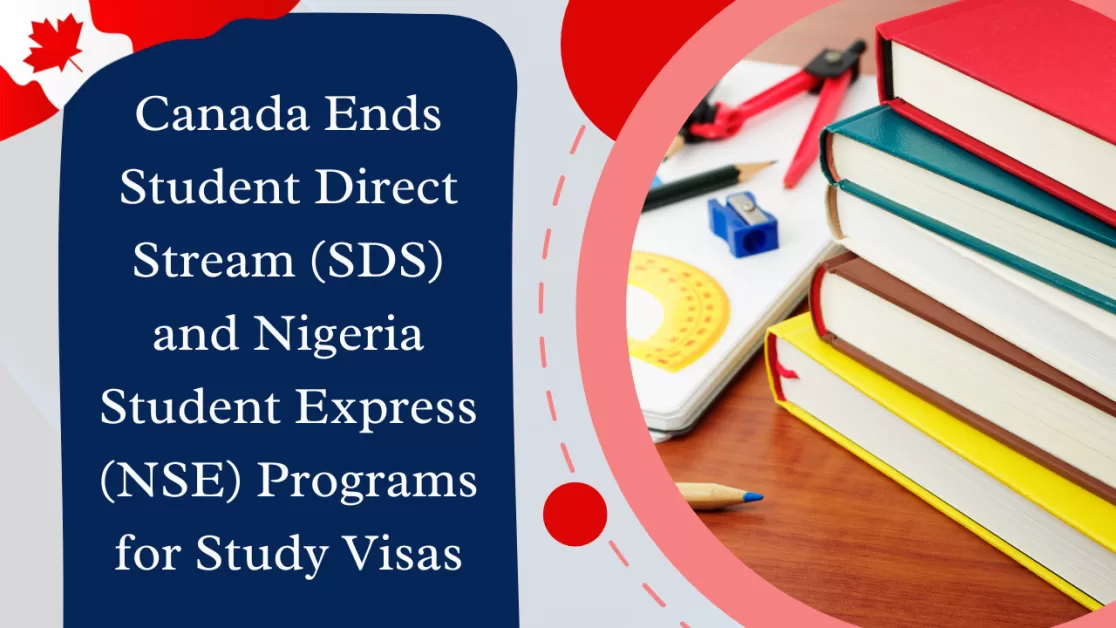
Canada has recently announced a major policy change affecting international students. The country has officially ended the Student Direct Stream (SDS) and the Nigeria Student Express (NSE) programs, which were designed to expedite study permit processing for eligible students from selected countries. This change, effective as of November 8, 2024, is part of Canada’s broader initiative to establish a more equitable, streamlined application process for all international students.
In this blog, we’ll explore what this policy shift means, why it was implemented, and how prospective students from former SDS and NSE countries can navigate the updated process.
Table of Contents
What Was the Student Direct Stream (SDS)?
Launched in 2018, the Student Direct Stream (SDS) was created to provide quicker study permit processing for students from specific countries, including India, China, the Philippines, and others. This expedited route was intended to simplify the process for students meeting certain financial and academic criteria, typically cutting down wait times from months to just a few weeks.
Countries eligible under SDS included:
- India
- China
- Philippines
- Pakistan
- Vietnam
- And several other countries across Latin America and Africa
By meeting key requirements, such as proof of a Guaranteed Investment Certificate (GIC) and language proficiency, qualified students from these countries could apply for study permits with reduced processing times.
Nigeria Student Express (NSE) for Nigerian Students
The NSE was introduced to support the high demand from Nigerian students seeking Canadian education, providing them with an expedited process similar to SDS. Thousands of Nigerian students benefited from faster processing, allowing them to pursue their academic goals in Canada with minimal delays.
As of November 8, 2024, however, Nigerian students will now need to apply through the regular study permit stream, facing the same processing times as applicants from other countries.
Why Canada Ended the SDS and NSE Programs
Canada’s immigration department, Immigration, Refugees and Citizenship Canada (IRCC), cited several reasons for discontinuing the SDS and NSE programs:
1. Strengthening Program Integrity
IRCC aims to ensure that Canada’s immigration processes remain reliable and transparent. By ending specialized streams, IRCC can apply consistent review standards across all applications, reducing the risk of vulnerabilities, such as fraud and misrepresentation.
2. Addressing System Vulnerabilities
Unfortunately, international students have sometimes faced issues of exploitation and misrepresentation within these specialized programs. The end of SDS and NSE allows Canada to better monitor study permit applications, providing a more secure process for all students.
3. Ensuring Equal Opportunity for All Applicants
Canada has become a globally attractive destination for international students, known for its inclusiveness and diversity. To uphold these values, IRCC is shifting to a uniform application process, giving all students an equal chance to study in Canada, regardless of their country of origin.
4. Enhancing the Academic Experience for International Students
Beyond entry into Canada, the government wants to ensure that students enjoy a positive academic journey. By refining the application process, Canada hopes to attract students who are genuinely committed to education and success.
Transitioning to the Regular Study Permit Stream
With SDS and NSE no longer available, all study permit applications must now be submitted through the regular study permit stream. Here’s what this change means for students:
- Proof of Financial Support: The GIC, which was a requirement under SDS and NSE, remains a viable option for students to show their financial capability under the regular stream.
- Consistent Application Standards: Students from former SDS and NSE-eligible countries are still welcome to apply, and the financial, academic, and language requirements set by IRCC remain unchanged.
- Processing of Existing Applications: Applications submitted under SDS or NSE before the November 8 cut-off will still be processed under the guidelines of those programs, ensuring those applicants retain the expedited benefits.
Impact on Students from Key Markets Like India and Nigeria
For students from high-demand countries like India and Nigeria, the discontinuation of SDS and NSE could mean longer processing times. In the past, these students benefited from streamlined processes, but with the shift to the regular study permit stream, wait times may increase. However, Canadian institutions continue to welcome students from these regions and encourage them to apply.
Canada’s universities and colleges have a strong global reputation, with over 800,000 international students attending each year. IRCC has emphasized that Canada remains open and committed to providing educational opportunities for students worldwide, regardless of their country of origin.
Next Steps for Prospective Students
If you’re planning to study in Canada, here are some essential steps to keep in mind:
1. Apply Under the Regular Study Permit Stream
All new applications must now be submitted under the regular study permit category, regardless of the applicant’s country of residence.
2. Provide Financial Documentation
Prepare to submit proof of funds, such as GICs or other accepted financial documents, to meet IRCC’s requirements and demonstrate your ability to support yourself during your studies.
3. Stay Informed on Policy Changes
It’s essential to stay updated on IRCC’s policies. Regularly check the IRCC website or consult with authorized immigration advisors to stay informed on any additional updates.
Canada’s Vision for a Unified Study Permit System
Canada’s decision to end the SDS and NSE programs represents a shift toward a more standardized immigration approach. While the decision may lead to longer processing times, it reflects Canada’s dedication to fairness, transparency, and integrity in its immigration system. The end of these programs marks a new era in Canada’s international student program, focusing on an even playing field for all applicants.
By addressing vulnerabilities and promoting equal access, Canada is shaping an inclusive academic environment where students from all backgrounds can succeed. Prospective students should familiarize themselves with the updated application requirements and prepare their documents well in advance to ensure a smooth process.
Canada’s goal remains to welcome students worldwide, offering them the opportunity to pursue their educational and professional dreams in one of the most sought-after destinations for international students.
Ready to explore? Start your visa application today and get one step closer to your adventure!
Don’t let uncertainties hold you back. Our team of expert overseas education consultants is readily available to assist you. Whether you have inquiries about:
- Specific document requirements
- Interview preparation tips
- Visa application timelines
We’re ready to provide personalized guidance tailored to your unique situation. Get in Touch Today at: +919041818122 and begin your journey with Vrinda International.
The information provided in this blog is for general guidance purposes only. Visa policies, application procedures, and fees are subject to change without prior notice. For the most accurate and up-to-date details, we recommend contacting us directly or consulting official sources. Feel free to reach out to us for personalized assistance with your visa application or travel needs.

